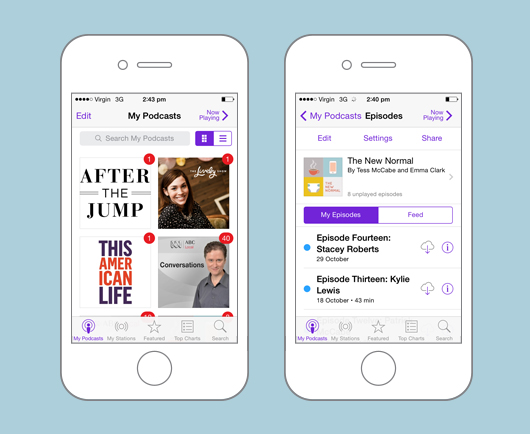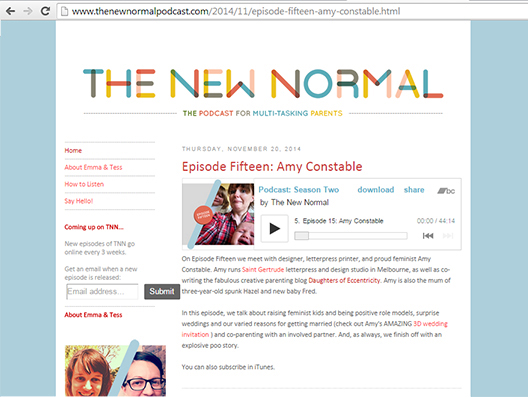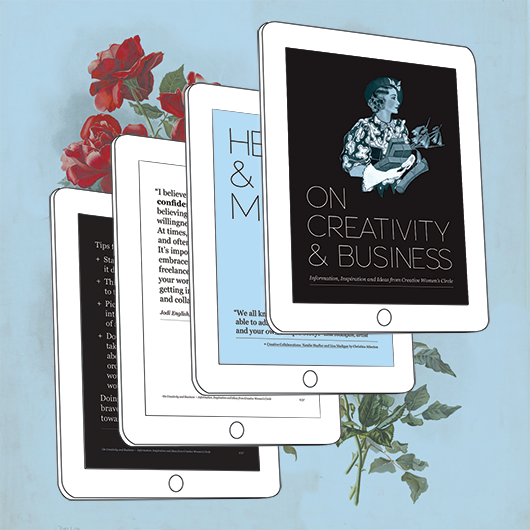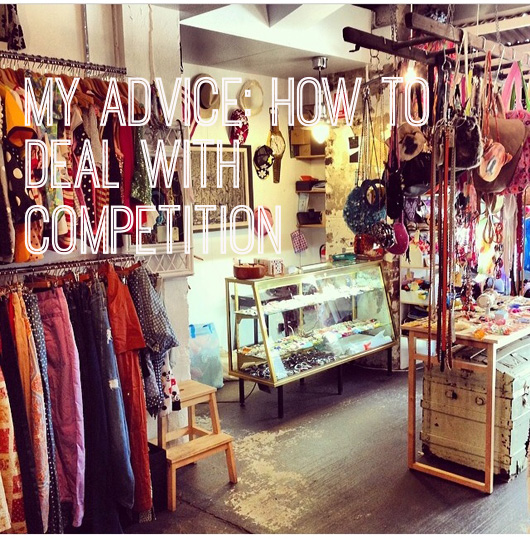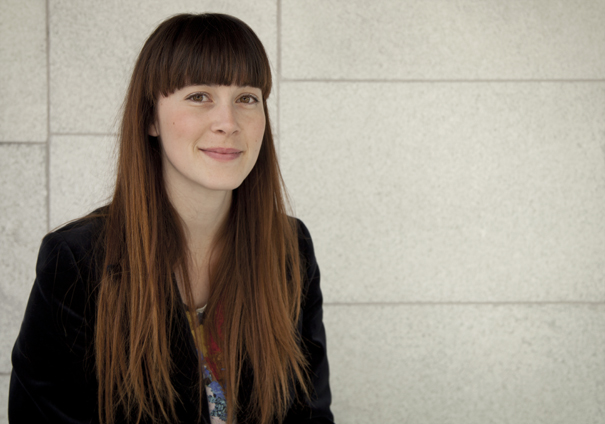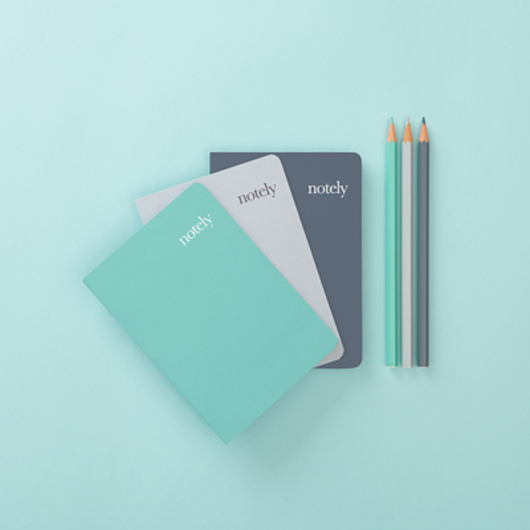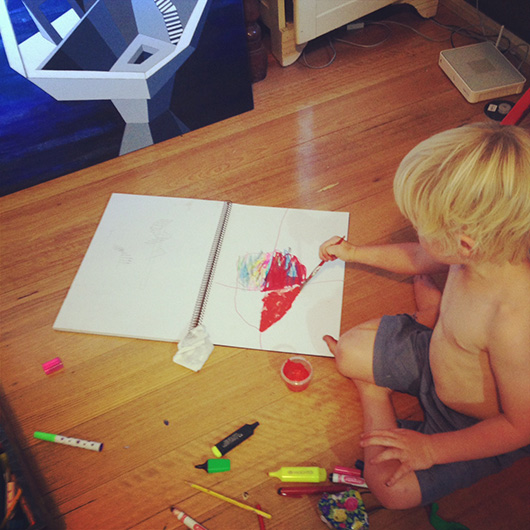How to download and listen to podcasts
As someone who has worked solo for much of my career, listening to podcasts as I go about my day have become a big part of my life. There are a few podcasts that I listen to regularly, and often times when I have found myself alone for 8 or more hours a day, their hosts have become like virtual studio mates. (There was a running joke when I was pregnant with my son that once born he would recognise Ira Glass' voice more readily than my husband's!)
My definition of a podcast is essentially an online radio program. Sometimes, actual broadcast radio programs will archive episodes online for listeners to access at any time. Other times, a podcast is only available online and not broadcast via any other media. These are usually pretty niche in their topic, and unless it's the focus of the show they rarely take breaks to play music. The podcast hosts are often just regular folk with something interesting to share (i.e. without any professional broadcast experience!).
Earlier this year, with my friend and fellow creative mum Emma Clark, I started a podcast: The New Normal. On each episode, we interview a guest about their experiences as parents, and try to glean how they make family life work while also maintaining a career or a business (and some semblance of a social life).
Probably the number one question Emma and I have been asked since starting our podcast is: How do I listen to it? Or indeed, any podcast?
So this post is a quick answer to that question. Disclaimer: I'm not the most up to date person when it comes to internet and mobile technology. I know slightly more than the basics, but don't expect this blog post to explain every available option to you with up-to-the-minute advances in podcast-listening-options. I know what I know, and hopefully it's enough to get you started!
I personally listen to podcasts in two ways. On my computer when I'm working there, or via my iPhone when I'm away from my desk.
Mobile phone listening
I have an iPhone 4, and the easiest way I find to listen to podcasts is through the Podcasts app. This app is free to download from the App Store, and after searching for the name of the podcast or finding one that looks interesting through the categories, I simply hit 'subscribe'. Every time a new episode of that podcast is released, the badge will tell you, and you can find and listen to past episodes as well. (Android users - check out this article for tips on getting podcasts onto your phone.) From there, hit play and away you go.
From the Podcasts app you can also download episodes directly to your phone, which is handy if you'll be (gasp!) without an internet signal for a while.
A word of warning though: most podcasts accessed via the Podcast app method use your 3G or 4G internet data allowance to stream the episode live (or to download the full episode). Thus constant podcast listening can chew through your data pretty quickly!
To avoid this, I'll often download episodes at home while my phone is connected to wifi, or download them via my computer as mp3 files and transfer them to my phone like I would with music. Which leads me to...
Desktop listening
I truly despise iTunes. I find it to be so user-unfriendly, but maybe that's just me (see non-tech-head disclaimer above). So generally when I'm listening to podcasts online from my computer, I do so by going directly to the podcaster's website. Plus, I figure this helps the podcaster to know how much website traffic/listeners they have and where they are coming from - something iTunes lacks!
Most podcaster's websites allow you to stream an episode live via an inbuilt 'player' on their web page. Here's an example of our website and the inbuilt player where you can listen directly. Remember though, if your internet connection drops out, or you accidentally close that browser window - there goes the episode!
Luckily, most of these players also have an option to download the podcast episode in full as an .mp3. If you download the episode in this way direct to your computer, that file can be played at any time (e.g. through your iTunes music library or other mp3 player). Our own CWC podcasts use this method so Members can listen to interviews and past event recordings.
Finding podcasts to listen to
What I like about podcasts is that I can really hone in on what interests me as a listener. When I'm feeling in the mood for creative business tips and interviews with my favourite bloggers and small business owners, I listen to Grace Bonney from Design*Sponge's show After the Jump, or Jess Lively's The Lively Show. I also like interviews with interesting people from all walks about their lives, and both Conversations with Richard Fidler and WTF with Marc Maron pump these out regularly. Radio journalism on quirky and interesting topics is also a favourite - for these I head over to RadioLab, This American Life, or their new spin-off, Serial. And who doesn't love discussing (in a passive listener way) the challenges of parenting, marriage and relationships? For these topics I like Totally Married, Death Sex and Money, and The Longest Shortest Time.
In terms of finding new shows to listen too, there are a few radio stations that put most of their shows online in podcast form, like our own ABC and WNYC in the US. On Stitcher you can search by category. Most of the podcasts I've found and love I have discovered via blog posts listing people's favourite finds - I bookmarked these posts by Kyla Roma and Cup of Jo (read the comments!) and revisit them when I'm on the hunt for something new.
In a nutshell, that's how I access podcasts and listen to them regularly. What's your method? And what are your favourite shows? Tell us via Facebook, Instagram or Twitter!
Next week I'll explain how we produce The New Normal if you're thinking of starting your own podcast!
Interview – Tess McCabe of CWC and Creative Minds Publishing
 By Andrea McArthur
By Andrea McArthur
Tess McCabe is a Brisbane-born, Melbourne based creative entrepreneur who has made Creative Women's Circle (CWC) the inspirational community that it is. Recently, Tess has also founded a resource for smart working creatives called Creative Minds Publishing. A big thanks to Tess for sharing her thoughts with us.
Can you give a brief description of your path to CWC and Creative Minds Publishing.
From an early age I’ve been a lover of printed things – books, magazines, posters, stationery – though it wasn’t until late high school that I could ‘name’ graphic design as the career path to follow. At that point I was pretty determined to make that happen, though I was also open to whatever opportunities came my way job-wise in the industry. So after a Bachelor of Design Studies at Griffith University in Brisbane, I worked for a big publishing house designing educational and non-fiction books. I also freelanced for small studios and my own clients creating brand identities, printed things and web stuff, and after a year of travel found myself working independently full-time in 2008 doing all of the above. As a ‘side project’ and as a way to meet people in my new home town of Melbourne, I took over coordinating CWC in 2009 from its founder Dearne Mills.
CWC grew in hops, skips and jumps, and in 2011 I was looking for a project that could combine my love of print and my interest in the stories of other creative women. I’m really passionate about promoting the work of women in creative industries and shining a spotlight on their career achievements. Thus Conversations with Creative Women was born, which seemed like a natural progression for CWC. That really sparked my interest and zest for self-publishing, so Volume Two appeared two years later.
I’m a keen observer and listener, and if I think that there is a need for a particular resource for the community of independent creatives I am so invested in to be realised, then I think of ways to make it happen. The launch of Creative Minds Publishing earlier this year is basically a way to put an umbrella over these ideas.

Describe CWC's core values?
We value shining a spotlight on the creative work of women, because we feel that women are vastly under-represented on many platforms that promote the work of creatives. But we also value sharing and uncovering the truth that there are many varied paths a creative career can take, not all of them conventional and most of them incorporating all of the other messy life stuff that comes with being a creative lady e.g. making money; having a family etc.
At what period did you feel CWC gaining momentum?
Probably after the release of Conversations with Creative Women: Volume One, and the introduction of memberships and The Circle Database in 2012. Those things extended the reach of CWC and meant connections between creative women from all walks reached beyond Melbourne’s borders (which at the time was the only place we held our in-person events).
Where would you like to take CWC in the future?
To be honest, 2015 could be a fairly significant year for CWC!
Event-wise, in 2014 we’ve had speaker events and Member’s Morning Teas in Sydney, Newcastle, Brisbane and of course Melbourne, and next year I’d love to see these events being hosted in the other capital cities and major regional centres as well.
As The Circle Database grows, it will be great to see more interaction between Members and more of their needs addressed through website upgrades and additions.
Structurally however, there are some changes which I’m hoping to make that mean the community of Members we’ve built will get to take a lot more ownership over the future direction of CWC. This is all in the planning stages at the moment, but more than it being an exciting thing for the group, it’s the right thing to do for the future of CWC and its sustainability as well. Stay tuned!

What is the next event that CWC is hosting?
We’ve just had our last speaker and morning tea events in Brisbane, Melbourne, Newcastle and Sydney for the year over the last few weeks. Now it’s time for some resting, recharging, plotting and planning before we get back into the swing of things in February/March next year.
How has networking helped you so far?
I’m not a native Melburnian, so when I moved here 8 years ago I didn’t know very many people. Plus, 12 months after settling here I decided to become self-employed and work from home, which wasn’t a great strategy for meeting new people! Networks like CWC helped me get the support I needed as an independent business woman but has also gained me some very dear friends along the way. I’m a pretty introverted person by nature, and traditional networking doesn’t gel with me, so I really built CWC up to be exactly the kind of non-threatening networking device I wanted (and that I could see other people liked as well!). Yes I have gained a few clients through it, but mostly it’s given me a cushion of support and many, many bursts of inspiration as I fumble through my own business ventures.
Has social media played a large factor in your businesses success as well?
Definitely. When I took over CWC in 2009, blogs were becoming popular but the other platforms we are so accustomed to now either didn’t exist, or weren’t as widely used yet. The introduction of Facebook, Instagram and Twitter and the ability for the CWC community to meet in person at events and then stay connected through those channels has been imperative to CWC’s success – they work hand in hand. Though if we could all agree to hold off introducing another social media platform for a while that would be great – it’s a lot to keep up with!
Have any of your creative businesses been a product of personal projects coming to life?
I suppose Creative Women’s Circle evolved from a side project into something I spend a lot more time on and take more seriously from a business perspective. I’ve learned to keep truly personal and fun projects out of the business sphere as much as possible, to that the pressure off and to ensure they stay fun.
Have you always had your “Creative Minds Publishing” idea in the back of your mind?
Having my own publishing company was not something I always intended to do. I tend to focus on 3-5 year goals, so professionally I know what I am working toward, but those goals are always somewhat vague (or have ‘feathered edges’ as I like to think). I have a very young family and my partner is also self-employed, and so professional goals at this stage of my life have to be fluid and flexible. I would go so far to say as I will probably always want to work in graphic design, in print, and spearhead my own projects with cool people, so that combination of things is what spurned Creative Minds Publishing. But I have no master plan for the brand just yet – I’d like to see it develop on its own first and then mould it from there.

When did you decide to act?
At the beginning of 2013, CWC held a speaker event with Melbourne intellectual property lawyer Sharon Givoni about protecting copyright for creatives. It was one of our most popular events to date, and afterwards over coffee Sharon and I mused that there wasn’t a single comprehensive resource available to creatives that explained the concepts she discussed in the workshop, and the issues her clients come to her with every day. With her interest in writing and mine in publishing, and our combined networks of creatives from which to draw inspiration and target the resource, it seemed like a natural next step to produce a book together: Owning It: A Creative's Guide to Copyright, Contracts and the Law. Formalising an imprint under which to release the book in 2015 was the impetus for launch Creative Minds in August this year. Plus, it made sense to re-release my earlier eBook Graphic Design Speak in print (yay!) to welcome the brand to the world!
Over the years how have you learnt your main business lessons. From trial and error, reading, workshops or bringing specialists in?
Probably the biggest lesson is to listen to the advice and feedback of others, but know when to take that advice with a grain of salt, and also know how to vet those to ensure they have your best interests at heart. In the past I have screwed myself over by not trusting people enough, and been screwed by trusting people too much. It’s tough steering a ship whilst also drawing the map – you need people around you but it can take time to find the right support network.
I read a lot, but not the kind of ‘business’ books you might think. I like memoirs, particularly comedian’s memoirs. Comedians are self-employed, creative, pursue a niche industry they are intensely passionate in - often for years before they find success - but at the same time they are acutely aware of the absurdity of life and how lucky they are to be able to do what they do for money. I like that attitude.
Many of the little nuggets of advice that rattle around my head are from CWC speakers, or interviews on our blog or the Conversations books. I feel pretty lucky to have that constant injection of real-life advice from other women who are steering their ships in the same ocean as me!

And, what advice has stayed with you.
I’m not sure if there is one specific piece of advice that is high above all the rest, but we all know that saying ‘no-one on their death bed ever wished they had spent more time at the office’. So probably the advice I try to keep front of mind these days is to work when it’s work time, enjoy family time when it’s family time, and relax when it’s relax time (and have a decent measure of all three in an average week!). That doesn’t always go to plan (I can’t help it if I come up with a great work-related idea when I am playing with trucks with my son!) but it’s important to keep trying.
Walk us through a day in the life of Tess.
I’m working full-time hours at the moment while my husband does the stay-at-home-Dad thing, something we consider ourselves pretty fortunate to be able to swing. So my day starts when my son, who is two-and-a-half, wakes up around 7am. From there all three of us amble around trying to get fed and dressed in a reasonable amount of time. I leave the house around 8am and walk to my office in a shared studio space five minutes away. Once there, I tackle the to-do list that I have made the previous day, usually starting with emails that have come in overnight. On an average day I will do a couple of hours of graphic design work for clients (while listening to my favourite podcasts), a couple of hours of work on Owning It or another smaller publishing project, and some time on CWC (preparing a blog post, emailing with a speaker or event host, tinkering with the website, or sending out book orders or membership packs). I’m pretty head-down-bum-up productive – way more so than when I didn’t have a kid and didn’t have to shut down my computer on the dot of 5.30pm. When I leave the office I head straight home to hang with my family and catch up on the day, wrangle the kid into a bath and then into bed, and then have dinner with my husband. After dinner I might do a gym class (no more than twice a week though... I hate exercising but have come to recognise it’s a necessary evil!), or record an episode of The New Normal Podcast with my friend and neighbour Emma Clark. Weekends are family time and I’m pleased to say I’ve stopped doing computer work on weekends – there’s just no time (or energy) after toddler taming and it’s nice to return fresh after a break from the big screen on Monday morning. I still check email and social media on my phone pretty regularly though... can’t break that addiction unfortunately.
What were you doing the last time you looked at a clock and realised you had lost all track of time?
Sadly it was probably tackling a rather unwieldy email inbox or getting stuck on a design. How I DO like to lose track of time is painting, or reading, or meals with family and friends.
- - -
You can become a member of Creative Women's Circle or view the titles under Creative Minds Publishing.
Andrea McArthur (www.andyjane.com) has a passion for all things visual and works as a Senior Graphic Designer in Dubai. Type is her true love and goes weak at the knees over beautiful design. You’ll find her sharing image musings on Instagram @andyjanemc.
New eBook from CWC: On Creativity and Business
By Tess McCabe Did you know that it's been 10 years of CWC this year? True. Over that time, there has been so much advice given, taken, and shared here, that it is hard to fathom the ripple effect of so many women connecting and sharing over that time and how it has strengthened the community.
As a celebration of sorts, over the last few months CWC's first intern Madeleine Dore poured over the hundreds of blog posts on this site and curated a collection of the best snippets of advice, tips, thoughts and musings from the women we have featured or who have contributed to our blog in some way.
The result is On Creativity and Business: Information, Inspiration and Ideas from Creative Women's Circle. It's 37 pages long, and available now for free for our Members... those who support us to keep going in this manner.
2015 is going to be an exciting year for CWC (with plans underway that will be revealed in due time!). But as the weather warms up and the year winds down, we hope our Members will enjoy this little gift.
And for those who are yet to join or who like to join in from afar, we encourage you to revisit our blog archives this summer and refuel your inspiration stores so that you too have a creative and productive 2015!
My Advice: How to deal with competition
I’ve always experienced some form of jealousy when it comes to my career and that of those around me; I think you have to be pretty confident not to. It’s almost impossible not to compare your achievements (or perceived lack thereof) with those of your peers when social media was basically invented for bragging. For artists, it can be seeing people doing ‘better’ than you, or work that is very similar. For writers, it’s seeing people getting their byline everywhere; and don’t they ever sleep?
Recently I experienced a terrible bout of anxiety when a business very similar to mine opened on the next block. For months before they opened I worried that I would never survive. I oscillated between wanting to be their friend and wanting very much to egg their shop (not even kidding… I didn’t, and the feeling was only fleeting. I’m just being brutally honest here). So it was with open ears and much anticipation that I awaited the response of these three women whose businesses I greatly admire, and whom I was sure had experienced something similar but handled it much better than myself. I was right.
And in case you are waiting for the end of my story; my shop is still going, I am indeed friends with the other business and, as it turned out, we are different and great in our own way. Competition is a very good thing if you know how to use it right.
Stay true to your values and don’t get too caught up in what other people are doing
Daniele Constance, Suitcase Rummage founder and arts practitioner.
When I was asked to write about dealing with competition, I think I felt my blood boil a little! In my work and practice I have had many ideas borrowed, collaborated with, copied, stolen and all of these experiences have had a different impact and brought with it varying emotions.
In general, I think a bit of a competition is good; it's healthy. It keeps you motivated to push your ideas, push your practice further and I think it's really important not to get complacent - particularly if you're starting to do well and seeing some success. Learn from other great ideas, great thinkers, get inspired, and put all of that into your own work.
While I am a big advocate for collaboration and finding ways to work with and support others, it is important to stay true to your values and not get too caught up in what other people are doing. Facebook and social media can be so valuable, but I've also found it to be crippling. I've spent hours trawling through photos, posters for events, blog posts, reviews .... but it's only as useful as you make it. Don't get caught up worrying up about what other people are doing, if their work is better, more successful (whatever the list is). My Dad always used to say to me, "Don't worry about what other people are doing. Focus on yourself." And he makes a good point. You can't control what other people are doing and how successful their businesses will be, but you can control yours.
More recently I have had the experience of others repeatedly using IP and branding that doesn't belong to them, and I think that is really wrong on so many levels. I'm not sure what it's like for other people, but for me it feels like the biggest betrayal. I'm not sure that I deal with it in the best way, but as artists and creative people we're always going to have that happen to some degree. And to some degree, we've all done it, whether we're aware of it or not. It's an excuse on some level for those out there who clearly can't think for themselves (and god I hate it when someone says, 'imitation is the best form of flattery'), but it's also realistic too.
I think my way of coping with it is to write the angry email I want to send, but keep it in my drafts. I come back to it a few hours later and edit it - or write a fresh one that leaves the emotion out. I've also found it useful to seek advice from lawyers and other creative business owners in how they deal with IP and copyright issues (almost everyone has their own story about it).
At the end of it all, it's about finding a balance, a place where you can use the competitive nature of business to move you forward, not backward. That's how I try to think about it, anyway; even when the emotions and stakes are high!
Come up with fresh ideas and stick to your own game.
Jess Barty, owner, Sunday Social
If I’m being honest, I can say that I used to struggle a lot with competition. But one day the penny dropped and I realised that worrying about it wasn’t doing me, or my business, any good.
Nowdays I don’t compare my business to others. Sunday Social has always been about being unique and fashion forward, so I just try to keep coming up with fresh new ideas and stick to my own game. I guess it keeps me on my toes and ensures I do my best!
You better check yourself before you wreck yourself – Ice Cube.
Jenica Smith, founder of Notely and Design Montage, and graphic designer
I recently finished reading #GirlBoss by Nasty Gal founder Sophia Amoruso. She has an excellent quote that really stuck with me with regard to competition. “Compete with yourself, not with others. Judge yourself on what is your personal best and you’ll accomplish more than you could ever have imagined.”
It can be really overwhelming flicking through Instagram and seeing all the gorgeous photos in your feed. I started noticing myself getting down about how nice everyone’s photos look. This led me to get into a habit of only going on there when I have something planned to post. Even though that sounds hard, if I have a day or two, or even just the day to consider my post, then when I do jump on there to post, I feel really excited about participating as I’ve done mine for the day.
The same trap can happen with reading blogs. You could read blogs all night long and then not actually write or plan any articles for your own blog. Perhaps if you are feeling affected by the rabbit warren of social media, then have a couple of days or a Monday to Friday week away from it to get back to your own thoughts.
Another quote I like to remind myself with is Ice Cube’s “You better check yo' self before you wreck yo' self.” Even writing this it makes me laugh! If I notice that I’m being more fleety and trying to check my Instagram or Facebook too often, I like to move those apps to the last app panel in my phone so it’s too hard to keep flicking to them to be able to check them on impulse and to see what everyone else is doing.
Lizzie Stafford is a lifestyle and entertainment writer and owns and runs Künstler, a magazine and bookstore in Winn Lane, Brisbane.
Meeting deadlines with kids underfoot
Picasso once said that; “our goals can only be reached through the vehicle of a plan, in which we must fervently believe, and upon which we must vigorously act. There is no other route to success”. I don’t imagine Picasso frantically making kids lunches, rushing to get out the door by eight in the morning, so he could then get back to his studio to paint in a three hour time frame, but I do like this quote as there were never truer words spoken. Basically if you add raising children to any plan that’s when the challenges truly begin.
Deadline stress is unavoidable and it seems that kids have inbuilt sensors which make them difficult when you least want them to be. So considering how to best manage your family as well as your creative work commitments will help you achieve maximum output with minimal stress.
I am a painter and a mother of four children, aged 3 to 17 years of age (with a baby due any day). So I have a broad range of needs to work around. I try and avoid overloading myself with commitments, but when an important date looms (for me that is usually an exhibition), there are things I do to make life easier for myself and my family.
I don’t recommend making a life out of living this way though. Seasons of work, and then rest, benefit everybody in a family. The wheels would come off my wagon if I did the things I am about to suggest all of the time. But, here goes: some things that work for me when facing deadlines with my business.
Simplify your wardrobe.
Get a “uniform”. Mine for a while now has been black converse shoes, jeans and simple T shirts. I just add a jacket or scarf if its cold. This means dressing requires little thought in the mornings and I can get ready in about ten minutes. I save dressing the way I want for weekends and when I am going somewhere “nice”! This also goes for hair, whats happening up there? If it takes you a half hour to dry and straighten it, maybe try a messy bun when you're flat out. You don't have to look unkempt, but streamlining your weekday wear will ease you into a busy day and give you time for other stuff.
Plan simple food.
I generally think about food for the week on a Sunday afternoon. Although I am not a menu planning/spreadsheet kind of girl, a little thought and a quick shop will make a big difference to your meal time stress levels for the week. When I mean simple food, I mean things such as one pot dinners like roasts and pastas. Children can get involved in making food which is also a great help. Lazy meals like soups with bread or slow cooked meals means you can put them on and forget about them until its time to eat.
Fill the fridge with fresh, easy to use ingredients.
When it comes to kids snacks, I cut back on baking and other foods that are time consuming to make. Instead I buy tubs of natural yoghurt and hommus, then for easy morning and afternoon teas I just have to add fruit or muesli to the yoghurt, or savoury biscuits, carrots and celery to the hommus. This keeps everyone full and healthy, without lots of preparation. It will stop you having to resort to the convenience of take away and it also saves money.
Negotiate with your partner/husband to share or take over bedtime and other household duties.
For example, when I am busy painting I can get so much more done if I can at least share the kids bedtime routine. If I can start working straight after dinner at night, I find that I have a lot more energy to paint and I am a lot more productive. If I wait until the kids are down for the night, I find it so much harder to restart my energy flow. Also, negotiate for weekend working time. My husband is really good at helping me get over the line when I am busy, but it does take good communication and verbalising your needs for this to happen. It is also about give and take, so be prepared for some compromise. When my husband is busy with his own work, I do of course try and pick up the slack and do the same for him.
Have an “in bed” and “out of bed” time for yourself!
When I am painting late into the night, I usually get a second wind at about eleven o'clock, even though I might have been exhausted at nine. So, I make myself go to bed by 12:30pm. The times I have broken this rule and stayed up half the night, I have paid for it by being very weary the next day and then I am not able to work the following night. I really have to be out of bed by seven to get everyone ready for school and to be prepared for the day ahead, so sleeping in is an impossibility. I seem to be able to function pretty well on seven or so hours sleep, so my set hours work for me, (though its still a commitment to work long hours). Work out what works for you and try to stick to it. To keep a bit of balance, I usually give myself a night off on a weekend, to watch a movie or do something with my husband.
Get a cleaner in on a regular basis, at least once a fortnight if you can.
If you have a busy life, this is probably my number one de-stressing tip! Having a cleaner won’t mean you don’t have to do housework, but it does ease the pressure on your household while you go AWOL into your creative workaholic zone. If you are worried about the cost of a cleaner, try tallying what you might spend on coffee, wine, or other extras, and all of a sudden a cleaner may seem cheap, (but be warned they are equally addictive).
Source some kind of childcare.
Childcare is a tough one I know, and it can be expensive, especially if your not making any money up front from your creative work. I have had different help at different times. My mother in law is wonderful and has had my youngest children many times when I have a deadline to meet. But mostly I have had to just work with my kids around (not ideal, but necessary at times). I have also paid my teenage children’s friends and other friends to play with and entertain my small children, (picnics or games in the back yard work for a couple of hours). I have used occasional childcare, in the form of two hour sessions available at my local gym. It does take focus to switch in and out of creative mode so quickly and work when you have limited time or you are sharing your head space, but it is better than no time to work at all.
Try and find creative ways to let your children work alongside of you, some of the time.
In my studio I have a couple of tubs of basic crafting materials. Pencils, colouring books, glue etc… My children don’t find me painting that exciting, as they are used to seeing me do it on a daily basis. This means they are happy to take up a corner (or half the studio) with their activities while I paint. Age is obviously a consideration, but stick some tunes on and you might get an hour or so of work done and they will get to use their own imaginations. It does take patience and tolerance and a certain kind of head space to make this work for you. If you have a deadline though, a couple of hours will be invaluable. If you are stuck for ideas, the internet is full of age appropriate kids activities, so get Googling!
Don’t take it all to seriously.
This is my last tip, and its because it’s probably the most important. While on the one hand it takes a hell of an effort and consistent commitment to pursue creative success and also raise a happy family, on the other hand , your family will always be your greatest measure of success. So, if you're having a day when you feel like you are banging your head against a wall and getting nowhere, or if you feel tired, frustrated and worn out, then the best thing you can probably do it take a deep breath, call a friend and head to the park or the beach, or somewhere that is not at home or your studio for a few hours! When I do do this I come home recharged and refreshed, my tank full again. Remember being a creative person should be fun! (at least most of the time).
Jasmine Mansbridge is a painter and mum to four (almost five) kids. She regularly blogs about the intersection of creative work and family life at www.jasminemansbridge.com, and you can also find her on Instagram @jasminemansbridge.
{All photos by Jasmine Mansbridge}
Want to contribute to our next book? A call for submissions.
As you may have heard, our sister-company Creative Minds Publishing and Tess McCabe are currently developing a book with lawyer (and former CWC speaker) Sharon Givoni called Owning It: A Creative's Guide to Copyright, Contracts and the Law.
We are now looking for images and quotes from the Australian creative community to pepper throughout its pages, so if you fit the following criteria – we’d love to hear from you!
Please have a read through this list to see specifically who and what we are after - and feel free to forward this onto your friends and colleagues (male or female!). If you tick one of these boxes please contact Tess via the email address at the bottom of this post and we'll get back to you! The deadline is Friday 14 November 2014.
Photographers
- You have a photograph that was taken in a public place that required a permit.
- You have an amazing photo that you want to show off.
- You are a wedding photographer who has clients agree to certain terms or conditions or sign a contract before their photo shoot.
Graphic designers, creative agencies and Illustrators
- You have created an advertisement that has adhered to a standard or voluntary code of conduct.
- You are a graphic designer and have portfolio examples of a branding and collateral project you’d like to show off.
- You keep drafts of your original illustrations (paper or digital) that show when they were created.
Makers and craftspeople
- Your products are made in Australia and customers can find out more about the makers on your website.
- Your products are made overseas and customers can find out more about the makers on your website.
Product designers
- You are a product designer who has registered a design with IP Australia.
- You have had a potential client sign a confidentiality agreement before showing them a new product or collection.
Tattoo artists
- You have beautiful high-resolution images of your work that you’d like to show off.
Architects
- You have beautiful high-resolutions images of your work that you’d like to show off.
- You get clients to sign a contract outlining your terms and timelines for a project including building variations etc.
Fashion designers
- You regularly use models in photo shoots and have them sign a model release.
Artists and galleries
- You are an artist registered with VisCopy.
- You are an artist who is registered or has received Resale Royalty Rights from a sale of your work.
Writers, poets, playwrights and publishers
- You are a playwright or poet who has had works published or performed.
- You have written and published an eBook.
- You are a writer/journalist registered with Copyright Agency Limited (CAL).
Musicians
- You are a musician or band who has licensed a song, signed a recording contract or who has a publishing deal.
- You are a performing musician who has professional images of yourself on stage.
- You have remixed or sampled another musicians work with their permission.
- You are a musician who is registered with APRA|AMCOS to receive royalties.
Retailers and galleries
- You are a retailer or yoga instructor and you pay APRA|AMCOS license fees to play music in your shop/studio.
- You sell artwork or products by other people on consignment, and have some kind of basic terms that outline when consignment $ are paid.
- You are a gallery that assists artists with receiving Resale Royalty Rights.
Film makers and animators
- You are a film maker (director/producer) who has professional images of ‘behind the scenes’ of a film set.
- You are an animator who has made an animated film or short film.
Business owners, sole traders, creative professionals
- You have a social media policy in place for your employees.
- You have a partnership contract in place in your creative business.
{Note that all contributions will be shown in a completely positive light, and while we unfortunately cannot afford to pay for contributions, all contributors whose work ends up in the book will be fully credited and receive a discount on the book’s sale price once it is released next year.}
Questions and expressions of interest in contributing can be directed to Tess McCabe at hello@creativemindshq.com.
Deadline: Friday 14 November 2014.
Creative collaborations: Trish Chong and Rhonda Mason from Life:Captured Workshops
Through their Life:Captured workshops, Sydney-based creative duo Trish Chong and Rhonda (Ronnie) Mason hope to equip others with the skills and resources to document their lives in beautiful and creative ways. They teach both the technical and emotional aspects of documentary photography right through to editing and workflow, photo book design and layout, journalling, memory keeping systems, life albums, and general organisation of photos and memorabilia. Today I ask Ronnie and Trish about the paths that led them to this point.
How did you meet? We met many moons ago at a mutual friend’s baby shower, and then on occasion at weddings in the years that followed. But we never really connected until the beginning of last year when our blogs led us to catch up with each other over coffee, and talk of family photography and memory-keeping workshops began. We were drawn to each other’s drive and passion for what we loved, and found the opportunities we had in front of us allowed us to work together in a fun and creative environment.
What are your creative backgrounds? Trish: I’ve honestly never thought of myself as all too creative. In high school I enjoyed turning up the radio and figuring out maths and chemistry problems, and ended up choosing a combined law and finance degree because I had no idea what I wanted to do. Through university there came an opportunity to backpack around the world with friends and I brought an old film camera with me, a gift from my uncle who no longer had a use for it. Through those experiences, I developed a love for the medium of film and the joy of capturing people and places which has stuck with me ever since.
Ronnie: My story is a little similar to Trish's. I grew up thinking I would become a commercial accountant working for a big firm, and therefore ended up studying a combined law and accounting degree. From there I enrolled myself into a marketing graduate diploma and when I finished my studies, I worked from the ground up in a small marketing department for a large international organisation. As I took on more branding and creative responsibilities, I soon realised that my passion lay in graphic design. Through a number of intensive training courses, I learnt to use the Adobe Creative Suite design software pretty quickly and I was soon creating all our marketing materials in-house. When I quit work a couple of years later, I started up my own commercial design studio and ran that for seven years. Even though I no longer work for commercial clients, my love for graphic design remains and has carried over into my blogging and my memory-keeping endeavours.
How did your collaboration on Life:Captured come about? As mothers, both of us realised how much each passing moment leaves behind as we travel through this world at the speed we now do. We were passionate about memory-keeping for ourselves, but also wanted to share this with others who may not have the same skills and experience as we do to make the whole journey enjoyable and easy to do. We both had a love for the tangible and wanted to teach others that it wasn’t really too hard to make beautiful keepsakes for themselves that they, and their loved ones, would treasure dearly now and in the years to come. It seemed only fitting that our combined skills of photography, organisation, and memory-keeping would be able to fill a niche that was not readily available in the current creative market.
What roles do you each play in the business? Trish: Ronnie is definitely the organised one in the partnership and she handles most of the paperwork and record-keeping. We share the communication and correspondence and keep to our strengths through the teaching elements. My aim is to simplify the elements of manual photography, breaking down both technical and emotional components and putting it all into practice, with a live shoot of a family during the workshop itself. We later teach our participants how to edit these same images using Adobe Lightroom software and reference them again whilst mocking up an album or layout. Following the workshop, I try and have images ready for both our blogs as well as for our sponsors to use to say thank you for their generous contributions.
Ronnie: Trish does a lot more than she's giving herself credit for! She's been liaising with most of our sponsors, and it was through her network and contacts that we were able to lock in RAW Space as the venue for our first two workshops. She also does all the photography work while I'm the one who works on the design of our marketing materials. Honestly, I love working with Trish's images. I think her photography and my design style are a good match. At the workshops, I teach an intensive crash course in photo organisation using Adobe Lightroom; my goal is always to equip our attendees with the ability to catalogue their entire personal photo library - both past and present. I also give a talk about memory keeping outlining methods of memory keeping that I find to be meaningful and effective to give our attendees ideas to develop their own framework for memory keeping. To wrap up the day, I also run through my fundamental principles for graphic design in the context of creating photo books, and I teach a mini session in learning the basics of Adobe InDesign.
Trish and Ronnie have recently launched their online portal, where they offer online classes to complement their Sydney-based workshops. See more at lifecapturedinc.com
{Photos by Trish Chong}


